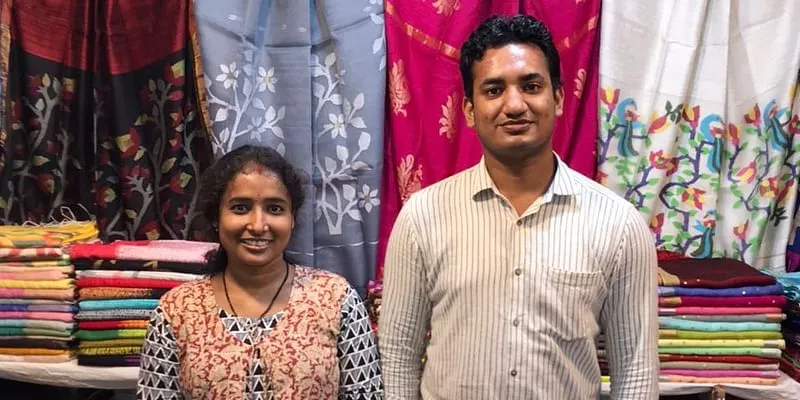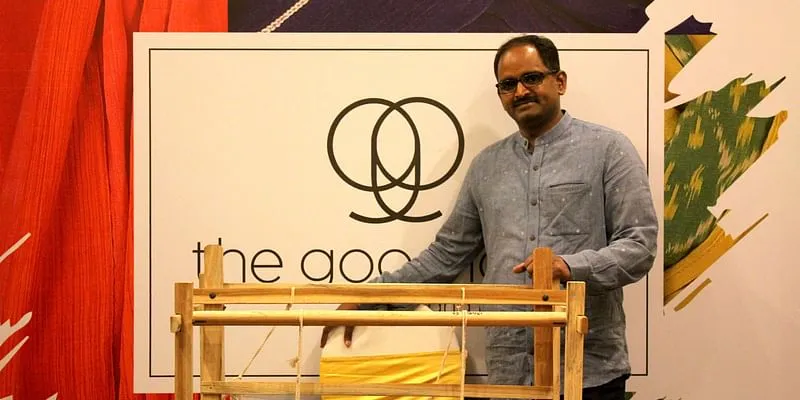National Handloom Day: This ecommerce platform is helping India's artisans sell globally during COVID-19
Bengaluru-based GoCoop, started by Siva Devireddy in 2012, sells handloom and handicraft products like suits, sarees, accessories, dupattas, and more, across India and 20 countries.
The coronavirus pandemic disrupted industries across the board. One of the segments that suffered immensely were textile workers and artisans, who did not have access to capital or technology.
Media reports suggest that the pandemic-led lockdown resulted in several handlooms and power looms shutting down. In addition, some artisans even died by suicide.
But, there are some people who have a different story to tell — the ones who were able to turn adversity into opportunity.
This includes Ranjana and Rajib Saha, a weaver couple from the small district of Phulia, West Bengal, and an artisan microentrepreneur Kaluram Jaipal from a village situated 140 km from Jodhpur.

Ranjana and Rajib Saha
Turning adversity into an opportunity
Speaking to SMBStory over Google Meet, clearly indicating the extent to which the pandemic has accelerated digitisation, Rajib said he was in a panic when the lockdown was announced. “Bohot pareshaani thi, funds ka issue sabse zyada the.” (We were in deep trouble, there was a lot of issues related to funds)
Rajib and his family, including his wife, parents, and in-laws, have been associated with the handloom industry for a very long time.
Before COVID-19 struck India, he admits that he was “not really interested in the internet or selling online”. But soon, realization struck that there was no other option.
Rajib had already been selling handmade sarees and stoles through its offline exhibitions for a couple of years. And the pandemic led him to list himself on GoCoop’s ecommerce site in May 2020.
Soon, he was able to clock sales worth Rs 2.7 lakh through the online channel and GoCoop’s online event in October 2020.
Stabilising income — digitally

Kaluram Jaipal
Kaluram is another instance of how the internet has changed the face of the Indian handloom industry. Belonging to a family of weavers, Kaluram is a micro-entrepreneur who also specialises in the craft of shibori, a tie and dye technique used to print designs on fabric.
Today, he has 20 women weavers working with him. Before 2018, his income was highly unstable as he would sell across different showrooms in and around Jodhpur and even sold his produce of sarees, dupattas, and fabrics in exhibitions held once in three-four months.
In 2018, he began selling through GoCoop’s offline exhibitions, which stabilised his income to some extent. The women working under him were able to earn Rs 5,000-6,000 a month. Everything was going well for him before COVID-19 struck.
“Earlier I thought the lockdown was for 20 days but it kept getting extended…” Kaluram tells SMBStory.
He adds that while “online was never our focus”, encouraged by GoCoop’s team, he decided to list online, and learnt the tips and tricks of online selling as well.
“I learnt how to take pictures from four different angles and make the product look presentable,” he says.
Kaluram claims that he was able to recover his money a bit and also pay his associates. They have not reached the pre-pandemic levels yet but hope to reach them in the coming months.

Siva Devireddy, Founder and CEO, GoCoop
GoCoop’s journey
There are millions of artisans, weavers, and others in India’s textile and apparel industry — worth $100 billion, according to IBEF— who are yet to realise the power of the internet.
In India, many like Okhai, FabIndia, Karagiri, Kankatala, are trying to digitise the industry.
Bengaluru-based GoCoop, started by Siva Devireddy in 2012, launched its website in 2014. It sells handloom and handicraft products like suits, sarees, accessories, dupattas, and more across India and in 20 other countries. It “is aiming to be the Amazon or Flipkart for handlooms and handicrafts,” says Siva.
He also highlights that several weavers, craftsmen, and artisans were hoarding stocks worth Rs 50-60 lakh, unsure how to liquidate them.
“We realised that most of the demand is going to be online, at least in the immediate future, because of the physical restrictions in markets. And we guessed it right,” says Siva.
The GoCoop team has been training artisans from even the remotest parts of the country on selling online, pricing, taking pictures, and much more. It deployed on-ground teams who knew the local language, which helped connect with this community better.
The company shifted its offline event GoSwadeshi online to further bolster sales. Six such online exhibitions were held between May 2020 and March 2021. GoCoop also launched a campaign ‘Local Se Global Tak’ to sell in international markets like the US.
Siva says the handloom industry has come a long way. He faced a lot of “scepticism” from the community, owing to a lack of awareness around ecommerce when he started his journey in 2012. But the pandemic changed things. Now, weavers and artisans are “willing to make the effort” to learn digital tools.
GoCoop claims it was able to liquidate stocks worth Rs 10 crore during the pandemic, and has enabled 160 co-operatives and master weavers to sell online, taking its total artisanal base to over 27,900.
“The pandemic has definitely dented some growth but we are slowly coming back up again. We hope to reach pre-pandemic levels by September,” adds Siva. The company is expecting to touch sales of Rs 2-2.5 crore in the coming months.
According to the founder, 27 percent of the company’s sales come from global markets and it plans to focus on these markets more in the coming months. Its top markets include the US, the UK, Australia, the UAE, and Singapore. Siva says that the international sales have almost doubled since everyone wants to buy online now.
GoCoop also wants to reach a monthly revenue rate of Rs 3 crore by the end of this year and expand to 100 clusters from 70.
“A lot more is yet to be done,” concludes Siva.
Edited by Saheli Sen Gupta










